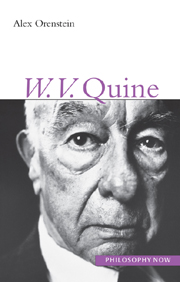8 - Nature, know thyself
Summary
Epistemology naturalized
The opening paragraph of this book outlined Quine's position as one of the foremost representatives of naturalism of his time. As stated there, his naturalism insists upon a close connection (an alliance) between philosophical views and those of the natural sciences. This has been amply documented in the preceding chapters, starting in Chapter 1 with expressing an ontology in terms of the science of logic, and then in Chapter 2 determining which ontology to accept by abiding by the same broad theoretical constraints that are invoked in connection with scientific theories. Chapter 3 explored how Quine's holistic empiricism resulted in viewing purportedly nonempirical a priori subjects such as mathematics and logic as holistically empirical in the same spirit as the more theoretical reaches of science. In later chapters his naturalist and empiricist views of language yielded criticisms of less naturalistic accounts of language and of philosophical practice, and yielded as consequences the two separate indeterminacies of reference (inscrutability) and of meaning.
While earlier naturalists would agree with Quine that our ontology is naturalistic, with Quine this took the form that our ontological commitments are derived from the sciences by appealing to themes concerning values of variables and holistic empiricism. Another aspect of Quine's naturalism is his approach to questions in epistemology – the theory of knowledge. Arguing that there is no standpoint outside of nature, philosophy, and in particular, epistemology, is no exception.
- Type
- Chapter
- Information
- W. V. Quine , pp. 173 - 190Publisher: Acumen PublishingPrint publication year: 2002

